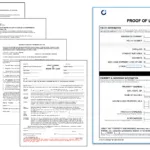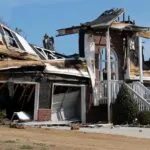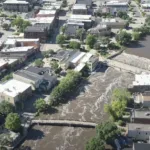Filing a homeowners or property insurance claim can be frustrating. Jumping into a claims process and dealing with insurance companies, adjusters, contractors, or attorneys immediately after your property is damaged can be a headache. Having your property damaged is already frustrating, and making an insurance claim and following it through to payment can be tedious. It’s not something you do every day, and it’s subject to nuanced and hard to understand state laws and regulations, as well as complicated policy terms. The good news, through, is that Kansas has protections for policyholders built into the insurance law, and the insurance regulations provide strict deadlines and requirements for the investigation and payment of property insurance claims. If policyholders are aware of these deadlines and rules, and are proactive with respect to their claims, they should have a smooth, fast, efficient, and fair insurance claim process.
These resources are built to help policyholders — and all the stakeholders who work with them, like adjusters, attorneys, contractors, and consultants. These resources will help you file your claim correctly, document your losses thoroughly, and know when and how to followup through the claim process. And, if necessary, how and when to escalate and resolve the claim.
Claim Filing Deadline
Reasonable time, set by policy
Kansas insurance law does not set forth any specific deadline for making a property insurance claim. This means that the deadline for informing the insurer of a claim is set by the policy itself
Initial Response Time
10 days
Kansas requires insurance companies to “acknowledge and act reasonably promptly upon communications with respect to claims arising under insurance policies.” Elsewhere in the law, Kansas specifies that an insurer must acknowledge a claim within 10 days from notification of claim.
Claim Decision Time
15 working days
In Kansas, the insurer is generally required to notify the policyholder whether their claim is accepted or denied within 15 working days from the insurer’s receipt of a properly executed proof of loss. Note, however, that this deadline can be extended.
Lawsuit Deadline
Set by policy
While general statute of limitation for breach of contract claims in Kansas is 5 years from the breach, Kansas allows parties to contractually shorten the limitations period. Accordingly, most property insurance policies in Kansas shorten the period and whatever is in the policy will control.
State Department
Kansas Department of Insurance
Kansas Department of Insurance
1300 SW Arrowhead Road
Topeka, KS 66604 – 4073
Phone: (785) 296-3071
Email: KDOI@ks.gov
File your Claim Now with ClaimSpot
ClaimSpot guides you through a quick, secure, and effortless filing experience.
It’s free. Let ClaimSpot Make Your Claim Fast & Easy.
Kansas Insurance Claim Guide
Filing: Kansas Insurance Claim FAQs
All insurance claims start by informing your insurance company of the loss. You want to do this as soon as possible. There are many ways to notify the insurance company. It’s most important that you keep a record of notifying them. Here are frequently asked questions about how to best “file your claim” with the insurance company in Kansas and the state regulations that will help (or hurt) you!
In order to initiate a claim under a property insurance policy in Kansas, the policyholder must inform their insurance carrier of the loss (either directly or through their agent), and that they are making a claim. This means that the only requirements to initiate the process is that the insurance carrier is informed that there has been a loss, some details about the loss, and that the policyholder wants to make a claim.
In many cases, an insurance company will call this communication a first notice of loss, or FNOL. In Kansas, insurance laws call this communication a “notification of claim.” Specifically, Kansas defines a notification of claim as: “any notification, whether in writing or other means acceptable under the terms of an insurance policy or insurance contract, to an insurer or its agent, by a claimant, which reasonably apprises the insurer of the facts pertinent to a claim.”
Most insurance companies provide multiple ways to contact them after a loss to begin the claims process, these usually include:
a. Phone call (a number is usually provided on the insurance company’s website);
b. Online portal – many insurance companies have an online form to notify the claims department of a loss, this may even be through a mobile app;
c. Your agent – many insurance companies even have a different section of their website or phone number for an agent to inform them of a policy-holder’s loss;
d. Online software as a virtual assistant.
While it is easy and quick to start a claim, claimants need to continue to follow-up and provide more information. In many cases, the insurer will require more information and supporting documentation, including specific forms, to actually process and adjust the claim. These specific necessary forms should be provided to the claimant by the insurance company.
1. Promptly inform your insurance carrier of the loss (see above);
2. As soon as possible begin to mitigate the damage – protect the property and secure it against further damage as soon as it is safe and possible to do so.
3. Cooperate with your insurance company and communicate with them (and keep copies of all correspondence).
4. Make your property available for inspection as soon as it is safe and possible to do so.
5. Prepare supporting documents for your claim including:
– Inventory list;
– Description of damages;
– Photographs and/or videos of the damage;
– Receipts; etc.
Reporting Deadline: Kansas insurance law does not set forth any specific deadline for making a property insurance claim. This means that the deadline for informing the insurer of a claim is set by the policy itself. It is important to be familiar with the insurance policy so that deadlines are not missed.
It is always best practice to inform an insurance company of the losses sustained and that a claim is being made as soon as it is reasonably possible to do so after the damage is incurred and a determination that a claim will be filed is made. While it is never a good idea to delay in providing the insurance company with information once it has been determined that a claim will be filed, the actual meaning of “immediate” or “prompt” or “reasonable” with respect to making a claim depends on the circumstances – if a home is completely destroyed by a storm and the phones, internet, and power are off, it may take a little longer to make the claim.
Be sure to check the language of the insurance policy to determine the notification or reporting deadlines. But, in any event, remember that best practice is to provide notice of the loss and claim to the insurer as soon as possible.
Followup: Document Your Kansas Insurance Claim FAQs
Notifying the insurance company about a loss is just the first step. The most important work comes next: documenting your loss and following up with the carrier. Kansas has enacted many regulations to guarantee that the insurance company acts moves promptly and fairly to investigate and pay your claim…but you need to understand these regulations and know the appropriate timeframes. That means communicating with the insurance company early and often and putting them on the clock. These FAQs will let you know the applicable standards.
Documentation Deadline: Kansas does not set a specific deadline to provide support for a claim by statute, but instead allows this timeline to be set by the policy itself. Generally, property insurance policies require that a proof of loss document be provided within 60 days of either when the loss occurred, or when requested by the insurer, so many policies use this language.
Kansas law does specifically note that with respect to damage or destruction of property due to fire or tornado, the insurance company is required to provide “proper blanks upon which to make the required proof of such loss with full directions as to what proof is required” within 10 days of notification of claim when there is a written request. It is important, therefore, for a claimant to request proof of loss forms and instructions immediately upon making a claim. The statute goes on to state that “in all cases the insured shall have a reasonable time in which to make such proof after the blanks and directions are received.”
In any event, however, the deadline for submitting a proof of loss may be extended by agreement between the parties. The standard policy proof of loss requirements need substantial information to be provided, so getting started quickly is crucial. Additionally, Oklahoma requires insurers to provide proof of loss and other policy-required forms within 30 days after receipt of notice of claim.
Note, however, that no matter the actual deadline for providing supporting documentation, it is always best practice to provide a proof of loss document and support of the claim as soon as possible (while noting that the document only presents the knowledge at the time and may be amended or updated). Getting a properly completed proof of loss to the insurance company quickly is a good way to get the claim process moving along, and to facilitate payment.
Kansas has adopted laws governing unfair claims settlement practices to protect policyholders and to provide a streamlined timeline for claims to be handled, and these laws provide deadlines for the acknowledgment and processing of claims. There is some discrepancy between the different locations in Kansas laws governing deadlines associated with insurance claims, with some using general guidelines like “promptly” or “reasonably” while other sections provide actual deadlines.
Deadlines for Acknowledgment: Kansas requires insurance companies to “acknowledge and act reasonably promptly upon communications with respect to claims arising under insurance policies.” Elsewhere in the law, Kansas specifies that an insurer must acknowledge a claim within 10 days from notification of claim.
Similarly, Kansas requires insurers to give an appropriate reply to all pertinent communications from a claimant which reasonably suggest a response is expected within 10 days from receipt of the communication; and to provide proof of loss forms and directions within 10 days of notification of claim when there is a written request.
Deadlines for Investigation: Kansas doesn’t really provide a specific breakdown of the time to begin an investigation of the claim. However, Kansas does specify that insurers are required to “adopt and implement reasonable standards for the prompt investigation of claims arising under insurance policies.” Further, the general requirement is that, absent a reasonable need for more time, Oklahoma insurance companies are supposed to “complete investigation of a claim within 30 days after notification of claim”
Kansas requires insurers to give an appropriate reply to all pertinent communications from a claimant which reasonably suggest a response is expected within 10 days from receipt of the communication.
Resolving: Get Paid & Protect Your Rights On Kansas Insurance Claim FAQs
Ultimately, the insurance claim must be approved and paid (or, unfortunately, denied). Getting to this step and getting the money has a lot of logistics…and that is if everything goes well. If all or any portion of the claim is debated (which is really common) then you need to escalate it. In either event, Alabama has regulations governing these timelines to guide the way. These FAQs show what is supposed to happen.
Deadline for Acceptance/Denial: Kansas insurance regulations generally require insurers to “affirm or deny coverage of claims within a reasonable time after proof of loss statements have been completed.” Similarly to the other deadlines discussed above, this is further described elsewhere in the law more distinctly. Specifically, the insurer is generally required to notify the policyholder whether their claim is accepted or denied within 15 working days from the insurer’s receipt of a properly executed proof of loss. If the insurer reasonably needs additional time to complete its investigation into whether to accept or deny the claim, the insurer must provide written reasons why more time is needed within the original 15-day period, and if the investigation remains incomplete, provide written reasons why 45 days after the date of the initial notification and every 45 days thereafter.
Deadline for Payment: Oklahoma requires that insurance companies must attempt “in good faith to effectuate prompt, fair and equitable settlements of claims in which liability has become reasonably clear.” Unlike the other deadlines discussed above, this is not defined more distinctly elsewhere in Kansas statutes.
If an insurance company is determined to be in violation of the unfair claims settlement practices requirements, the insurer can be subject to penalties. While the unfair trade practices requirements do not create a private right of action (the ability for a policyholder to sue the insurance company directly for breach) the policyholder can report the company to the Department of Insurance under the Uniform Trade Practices Act for improper handling of claims.
While Kansas does not allow policyholders to make “bad faith” claims against their insurer as a separate tort, a policyholder may file suit against the insurer for breach of contract – and potentially make the argument that the insurer violated a specific clause of the insurance contract by violation of their duty of good faith and fair dealing. Additionally, in certain circumstances the insured may be able to recover attorneys’ fees from the insurer.
Deadlines to File Suit: While general statute of limitation for breach of contract claims in Kansas is 5 years from the breach, Kansas allows parties to contractually shorten the limitations period. Accordingly, most property insurance policies in Kansas will shorten the period to 1 or 2 years. But note that generally, whatever the policy says will apply to suits arising from that policy.












